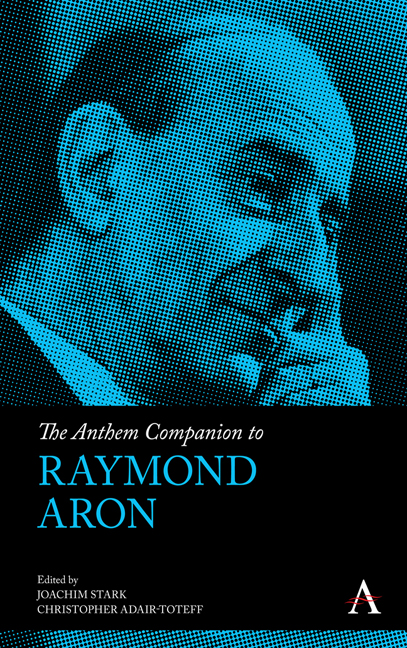Book contents
- Frontmatter
- Contents
- Acknowledgements
- Introduction: Retracing Aron’s Routes to Sociology
- Chapter One The Subject, Pluralism and Équité: Raymond Aron and Sociology
- Chapter Two Aron, Weber and Nationalism
- Chapter Three Equivocal and Inexhaustible: Aron, Marx and Marxism
- Chapter Four The Opium of the Intellectuals
- Chapter Five A New Era in the Human Adventure: Industrial Society and Economic Growth
- Chapter Six Raymond Aron: La lutte de classes
- Chapter Seven Political Philosophy Meets Political Sociology: Raymond Aron on Democracy and Totalitarianism
- Chapter Eight The Contradictions of Prometheus: Wisdom and Action after the Disillusionment of Progress
- Chapter Nine The International Problem and the Question of the Best Political Regime
- Chapter Ten War and Irrationality: Aron and Pareto
- Conclusion: Aron on Liberty
- Notes on Contributors
- Index
Chapter Seven - Political Philosophy Meets Political Sociology: Raymond Aron on Democracy and Totalitarianism
Published online by Cambridge University Press: 22 February 2022
- Frontmatter
- Contents
- Acknowledgements
- Introduction: Retracing Aron’s Routes to Sociology
- Chapter One The Subject, Pluralism and Équité: Raymond Aron and Sociology
- Chapter Two Aron, Weber and Nationalism
- Chapter Three Equivocal and Inexhaustible: Aron, Marx and Marxism
- Chapter Four The Opium of the Intellectuals
- Chapter Five A New Era in the Human Adventure: Industrial Society and Economic Growth
- Chapter Six Raymond Aron: La lutte de classes
- Chapter Seven Political Philosophy Meets Political Sociology: Raymond Aron on Democracy and Totalitarianism
- Chapter Eight The Contradictions of Prometheus: Wisdom and Action after the Disillusionment of Progress
- Chapter Nine The International Problem and the Question of the Best Political Regime
- Chapter Ten War and Irrationality: Aron and Pareto
- Conclusion: Aron on Liberty
- Notes on Contributors
- Index
Summary
Raymond Aron's life and political reflection was coextensive with the totalitarian epoch that emerged with the Bolshevik revolution of 1917 and came to an end with the implosion of the Soviet Union in the years immediately following his death in 1983. He did as much as any man could do to educate Western public opinion about the nature of totalitarianism, but he did not live to see the final defeat of the regime based upon the ideological Lie. His was a welcome if posthumous victory.
It was the rise of National Socialism in pre-Hitler Germany that cured Aron of progressivist illusions and awakened him to the deadly threat that totalitarianism posed to Western civilization. Studying and teaching in Cologne and Berlin between 1930 and 1933, he “felt, almost physically, the approach of historical storms,” as he so suggestively put it in his Inaugural Address to the Collège de France in 1970. As a result of that experience, he “ceased to believe that history automatically obeys the dictates of reason or the desires of men of good will.” He “lost faith and held on, not without effort, to hope.” He “discovered the enemy” that he would relentlessly pursue all his adult life—“totalitarianism.” “In any form of fanaticism, even one inspired by idealism, I suspect a new incarnation of the monster,” he writes—a formulation that can serve as his mature political credo. If National Socialism revealed the “diabolical essence” of a politics bereft of all decency and any respect for common humanity, the Soviet Union showed the monstrous consequences of all efforts to build heaven on earth. In the years before 1945, Aron concentrated on analyzing and exposing the National Socialist subversion of humanity. In the post-1945 years, he turned his attention to a critique of Communist totalitarianism, while never forgetting it kinships with, and differences from, its frère-ennemi, National Socialism.
Aron's critique of National Socialism as an essentially revolutionary and totalitarian state and movement is expressed with rare eloquence and authority in his June 17, 1939, address to the French Philosophical Society on “Democratic and Totalitarian States.” The 34-year-old Aron spoke as a self-declared adherent of “democratic conservatism.” Drawing largely on intellectual categories provided by Max Weber and Vilfredo Pareto, he drew a portrait of the new revolutionary “elites” who set the tone for totalitarianism in Hitler's Germany.
- Type
- Chapter
- Information
- The Anthem Companion to Raymond Aron , pp. 119 - 132Publisher: Anthem PressPrint publication year: 2021

